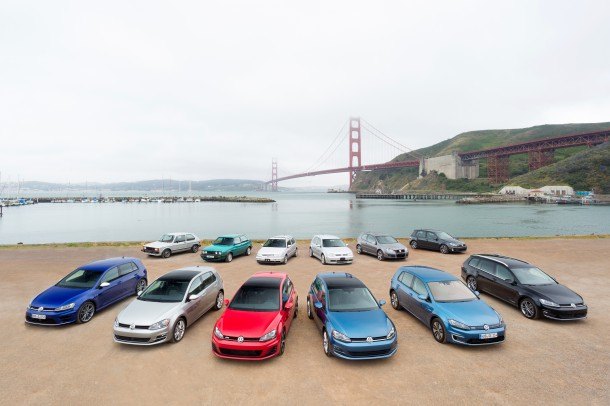Volkswagen USA's Bright Spot Is The Golf, But The Bulb Isn't Very Big
During a month of great turmoil at Volkswagen’s German HQ, including expressions of real disappointment regarding the brand’s lackluster performance on the other side of the Atlantic, Volkswagen of America tripled its Golf sales total.
Yes, U.S. sales of the Volkswagen Golf line skyrocketed 206% in April 2015, year-over-year. Yet with only 5,508 total Golf sales last month, the Golf continues to be a low-volume compact car in the United States. Combined, the Jetta and Golf (which no longer share a platform) are still just upper-mid-pack players, nearly 900 sales back of the fifth-best-selling compact, the Ford Focus, last month.
The Golf family was, however, the key bright spot at Volkswagen of America in April. Brand-wide sales slid 3% in April 2015, the third consecutive month (and 21st in 25) that Volkswagen brand sales have decreased on a year-over-year basis.
April sales of the Tiguan and Touareg grew, but only to the tune of 426 extra units. The Jetta sedan’s 5% increase was an exception to a rule that saw Jetta sedan volume slide 6% through the first four months of 2015. Meanwhile, sales of the Beetle, CC, discontinued Eos, and Passat fell precipitously both in April and the first-third of the year.
The picture is clear. It’s all down to the Golf.
Non-Golf sales at Volkswagen are down 18% year-to-date in a new vehicle market that’s exceptionally healthy. Auto industry sales are up 5.4% so far this year; excluding the VW brand, sales are up 5.7%.
Yet even at these exceptionally high Golf sales levels – by Golf standards – it’s an insufficiently effective model in the United States. Globally, it’s among the best sellers. Locally, it’s a car which generates its moderate level of popularity with niche-filling products and cult classics: diesel-powered hatchbacks, hot hatches, and wagons.
Thankfully, such models exist (and even cohabit in the form of the Golf TDI SportWagen). But they’re not common cars. Volkswagen sold 1,739 copies of their core Golf hatchback in April, 1,228 Golf SportWagens, 309 e-Golfs, 327 Golf Rs, and 1,905 copies of the top-selling Golf, the GTI. The 5,508-unit total achieved by the whole lineup marked the highest April output for the Golf since 2000, Volkswagen of America says, but equalled just 18% of the brand’s April total and just 11% of the VW Group’s April U.S. total.
There’s good news and bad. Golf success is obviously a good thing, but Volkswagen would need infinitely greater success in the game of Golf to make up for disappointment in other parts of the lineup.
Timothy Cain is the founder of GoodCarBadCar.net, which obsesses over the free and frequent publication of U.S. and Canadian auto sales figures. Follow on Twitter @goodcarbadcar.
More by Timothy Cain
Latest Car Reviews
Read moreLatest Product Reviews
Read moreRecent Comments
- Buickman if they name it "Recall" there will already be Brand Awareness!
- 1995 SC I wish they'd give us a non turbo version of this motor in a more basic package. Inline Sixes in trucks = Good. Turbos that give me gobs of power that I don't need, extra complexity and swill fuel = Bad.What I need is an LV1 (4.3 LT based V6) in a Colorado.
- 1995 SC I wish them the best. Based on the cluster that is Ford Motor Company at the moment and past efforts by others at this I am not optimistic. I wish they would focus on straigtening out the Myriad of issues with their core products first.
- El Kevarino There are already cheap EV's available. They're called "used cars". You can get a lightly used Kia Niro EV, which is a perfectly functional hatchback with lots of features, 230mi of range, and real buttons for around $20k. It won't solve the charging infrastructure problem, but if you can charge at home or work it can get you from A to B with a very low cost per mile.
- Kjhkjlhkjhkljh kljhjkhjklhkjh haaaaaaaaaaahahahahahahahaha



































Comments
Join the conversation
It's the reliability reputation. That's it. And they KEEP killing themselves. They don't fix any of their problems. If it's not ignition coils, it's carbon build up or bad water pumps. And the negative word of mouth will continue to BURY them. Look at the other mainstream automakers that tried to sell crap. GM, Ford, and Chrysler were all near death. The only reason they're still around is the US Government and patriotic buyer goodwill. VW doesn't have that. It's really too bad, because every time I buy a car, I want to consider a VW. I love the GTI and GLI.
When Golf/GTI production was shifted to Mexico and the SportWagen joined the rest of the planet as a Golf, it looked like VW was finally going to lean on the Golf lineup as a volume car in the U.S. The thing is, they haven't, and I don't understand why. Compared to a similarly equipped Jetta, a lease on a Golf is oftentimes $100/month more. That makes no sense. If they were to get Golf and Jetta leases somewhere close to equal, they would move all the Golfs and GTIs they could get their hands on.